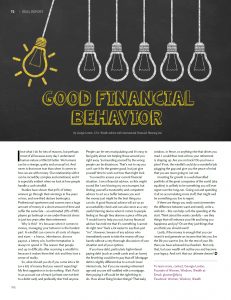What to do with a windfall (RealLife Spring 2017 Issue)
I love what I do for lots of reasons, but perhaps most of all because every day I understand human nature a little bit better. We humans can be a strange, quirky and unusual lot. And never is that more true than when it comes to how we are with money. Our relationship with it can be incredibly complex and emotional, and it is especially evident when we look at how people handle a cash windfall. Studies have shown that 90% of lottery winners go through their winnings in five years or less, and one-third declare bankruptcy. Professional sportsmen and women earn a huge amount of money in a short amount of time and suffer the same fate – an estimated 78% of NFL players go bankrupt or are under financial stress in just two years after their retirement.
 Why is this? It’s because when it comes to money, managing your behavior is the hardest part. A windfall can come in all sorts of shapes and sizes – a bonus, inheritance, divorce payout, a lottery win, but the temptation is always to spend it. The reason that people end up in difficulty after receiving a windfall is because it makes them feel rich and they lose a sense of reality.
Why is this? It’s because when it comes to money, managing your behavior is the hardest part. A windfall can come in all sorts of shapes and sizes – a bonus, inheritance, divorce payout, a lottery win, but the temptation is always to spend it. The reason that people end up in difficulty after receiving a windfall is because it makes them feel rich and they lose a sense of reality.
So, what should you do if you come into a bit (or a lot) of money that you weren’t expecting? My first suggestion is to do nothing. Wait. Put it in an account out of reach (at least one not tied to a debit card) and preferably don’t tell anyone. People can be very manipulating and it’s easy to feel guilty about not helping those around you right away. Surrounding yourself by the wrong people can be disastrous. That’s not to say you can’t use it for the greater good, but just give yourself time to work out how that might look.
You need to assess your current financial situation. I am a financial advisor, so this might sound like I am blowing my own trumpet, but finding yourself a trustworthy and competent advisor to act as a buffer between you and the money just might be the best thing you can do. A good financial advisor will act as an accountability check and can also serve as a very useful blaming device when it comes to people feeling as though they deserve a piece of the pie. “I would love to help you out, but my financial advisor has told me that it’s something I cannot do right now” feels a lot easier to say than just “no”. However, beware of any advisor who immediately wants to take the money off your hands without a very thorough discussion of your situation and all your options.
If you have debt, particularly high-interest paying debt (such as credit cards and car loans) the first thing would be to pay that off. Mortgage debt is slightly different due to a much lower interest rate, but if you are nearing retirement age and you are still saddled with a mortgage, then paying it off could be the right thing to do. How about fixing broken things? That leaky window, or fence, or anything else that drives you mad. I would then look at how your retirement is shaping up. Are you on track? Do you have a plan? If not, the windfall could do a wonderful job plugging the gap and give you the peace of mind that you are never going to run out.
Investing for growth in a well-diversified portfolio of the great companies of the world (aka equities) is unlikely to be something you will ever regret over the long-run. Going out and spending it all on accumulating more stuff, that might well be something you live to regret.
If there are things you really want (remember the difference between want and need), write a wish-list – this can help curb the spending at the start. Think about the wants carefully – are they things that will enhance your life and bring you happiness and joy? Or are they just things that you think you should want?
Lastly, if the money is enough that you can invest it and generate an income that lets you live the life you want to live, for the rest of your life, then you have achieved true freedom. Not only that, but your wealth will outlive you and become your legacy. And isn't that our ultimate dream?
